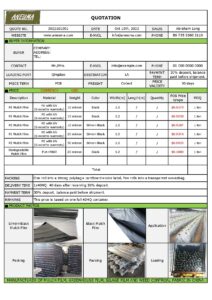In the world of greenhouse cultivation, where precision and care define success, the influence of environmental factors cannot be underestimated. Among these factors, condensation – the formation of water droplets on surfaces – can present a unique challenge for growers. The innovation of greenhouse films with anti-condensation properties has emerged as a game-changer, mitigating the potentially detrimental effects of excess moisture on plants. In this article, we’ll delve into the science, benefits, and practicality of employing these advanced films in your greenhouse.
The Science of Condensation
Condensation is a natural phenomenon that occurs when warm, moist air comes into contact with cooler surfaces. In a greenhouse, where varying temperatures and humidity levels prevail, condensation can accumulate on the interior surfaces. This occurrence not only obstructs sunlight but also poses a threat to the health of plants. Water droplets can serve as a breeding ground for fungi and diseases, compromising the vitality of your crops.
Understanding Anti-Condensation Greenhouse Films
Enter greenhouse films with anti-condensation properties – a sophisticated solution designed to counter the challenges of condensation. Unlike traditional coverings, these films are engineered with specialized coatings and surface treatments that discourage water droplet formation. By addressing the root cause of condensation, these films empower growers to provide optimal growing conditions for their plants.
Mechanism of Anti-Condensation Films
The magic behind anti-condensation films lies in their surface properties. These films are equipped with advanced technologies that alter the surface tension of the material. This alteration creates an environment that encourages water molecules to spread out instead of forming concentrated droplets. As a result, the moisture is dispersed across the surface, minimizing the chances of drip formation.
Benefits for Plant Growth
The benefits of anti-condensation films extend beyond the prevention of unwanted drips. By curbing excess moisture, these films create an environment that hinders the growth of fungal diseases. Healthier plants not only exhibit stronger growth but also boast enhanced resistance to various environmental stresses.
Climate Control and Energy Efficiency
Anti-condensation films play a pivotal role in maintaining optimal greenhouse conditions. By preventing excessive moisture buildup, these films contribute to more consistent humidity levels. This controlled environment translates to better climate control and reduces the need for frequent ventilation. Consequently, energy consumption is lowered, translating into cost savings and a more sustainable greenhouse operation.
Sustainability and Longevity
In the pursuit of sustainable agriculture, the longevity of materials used is a critical consideration. Anti-condensation greenhouse films are no exception. Their ability to withstand the challenging greenhouse environment ensures that growers can reap the benefits over an extended period. By reducing the need for replacements, these films align with environmentally conscious practices.
Practical Application and Installation
Bringing the benefits of anti-condensation films to fruition requires proper installation and maintenance. When installing these films, ensure a tight fit and eliminate creases that might hinder their performance. Regular cleaning is essential to preserve their anti-condensation properties and overall effectiveness. Utilizing mild cleaning agents and non-abrasive techniques will keep the films in prime condition.
Conclusion: Enhancing the Greenhouse Experience
The integration of greenhouse films with anti-condensation properties marks a significant advancement in modern horticulture. By addressing the challenges posed by condensation, these films empower growers to provide an environment that nurtures thriving plants. From disease prevention to energy efficiency, their benefits are manifold. As you embark on your journey of cultivating healthier crops and optimizing your greenhouse, consider harnessing the power of these innovative films. In doing so, you’re not only preventing drips on your crops but also fostering a flourishing, fruitful garden.

